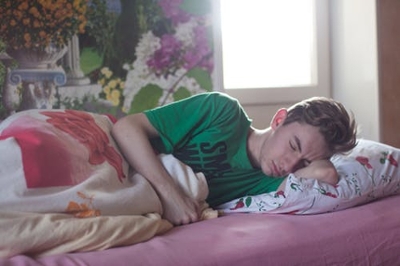I’m enjoying most things about being in college, but there’s one thing that’s been really rough: I’m not getting good sleep anymore! When I was in high school, I could head home after baseball practice and fall asleep almost immediately. Now, I get back after classes or after a party and stare at the ceiling for what feels like (and sometimes is!) hours. Is it that I’m not getting enough exercise? Is it the unfamiliar surroundings? Please, experts, tell me how I can get better sleep!
Sleep is something that’s easy to take for granted when it comes easily. But, as you’re experiencing, getting lousy sleep makes it easy to realize just how important sleep has been all along. Those of us who suffer from sleep deprivation will experience a laundry list of unfortunate symptoms, experts explain. Lack of sleep makes us irritable, hurts our critical thinking, and limits our reaction time. Sleep issues are connected to mental health issues such as anxiety and depression. Sleep deprivation also makes us sleepy during the day, of course!
On the flip side, getting good sleep is great for your health. Regular sleep patterns and high-quality sleep will reverse those sleep deprivation symptoms, making you feel alert and energetic. Great sleep will reduce your risk of getting sick and will help your mental health, too.
So what’s causing your lack of sleep? It’s hard to say for sure. It’s certainly possible that the rigorous exercise you got at baseball practice helped you fall asleep faster, and that you’re having trouble sleeping now because of the change in your habits. It’s also possible that you’re harming your sleep in other ways. For instance, using devices that emit blue light (like smartphones) at night can mess with your brain’s ability to tell that it’s nighttime. It could also be that your lifestyle choices are hurting your sleep. You mention coming back from parties — have you been drinking at these parties? Alcohol can wreck the quality of your sleep, leaving you tired and throwing off your sleep schedule. And staying out late partying means that you’re disrupting your sleep schedule even if you’re not ingesting lots of booze.
You should examine the lifestyle choices you make that could be throwing off your sleep schedule and causing the quality of your sleep to decline, and you should change bad habits wherever you find them. You should also work proactively to develop good habits that actively help your sleep.
What sorts of good habits? For starters, you should strive to go to sleep and wake up at the same time every day. Your body is designed to work in something called a circadian rhythm — a day-night wake-sleep pattern that mirrors the movements of the sun. When you go to sleep later or earlier than usual, you throw off that rhythm and hurt your sleep.
Consider your sleep environment, too. You’ll get better sleep if you rest in a cool, dark, quiet, and comfortable place. That can be tough to accomplish in a college environment, of course; but a sleep mask could help you get some rest even if your roommate is staying up, and earplugs or a white noise machine can help you block or down out the noise of rowdy students outside or down the hall. As for comfort, a Memory Foam Bed or other high-quality bed is your best option. If you’re living off-campus, consider getting a better bed; if you’re on-campus, check the size of the dorm-room mattress and see whether you can swap it out for a better one that you can hold onto for years.
Finally, you can consider your exercise schedule. You don’t have to exercise right before you sleep, but you should be getting regular exercise. In addition to tiring you out a bit, this will help your overall physical and mental health, which could help your sleep.
Hopefully, you’re just a few small changes away from a great night’s sleep. If you find that you can’t correct your sleep issues, speak with a medical professional.
Content Proivided By Scholarship Media


